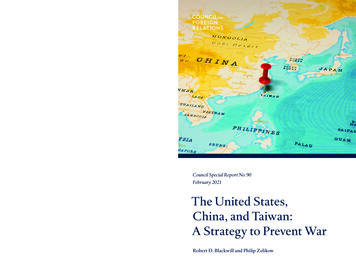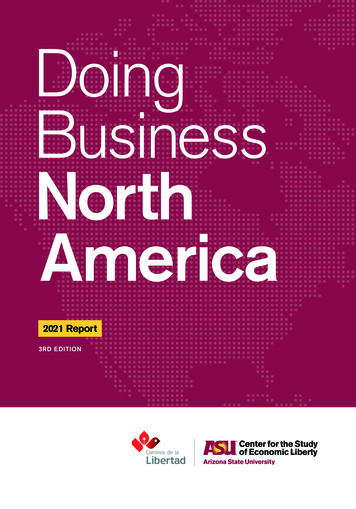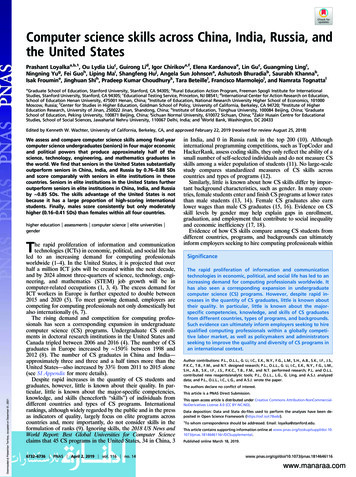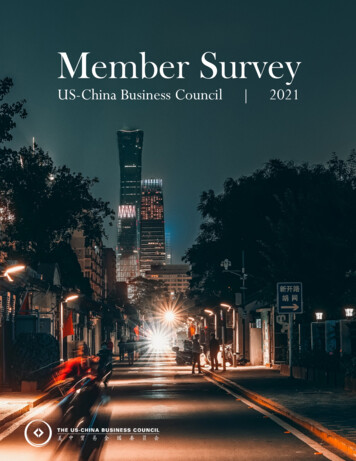
Transcription
Council Special Report No. 90February 2021Cover photo: A red pin indicates Taiwan on a map of East Asia.(hyotographics/Shutterstock)Council on Foreign Relationscfr.org58 East 68th StreetNew York, NY 10065tel 212.434.94001777 F Street, NWWashington, DC 20006tel 202.509.8400The United States,China, and Taiwan:A Strategy to Prevent WarRobert D. Blackwill and Philip Zelikow
Council Special Report No. 90February 2021The United States,China, and Taiwan:A Strategyto Prevent WarRobert D. Blackwill and Philip Zelikow
The Council on Foreign Relations (CFR) is an independent, nonpartisan membership organization,think tank, and publisher dedicated to being a resource for its members, government officials, businessexecutives, journalists, educators and students, civic and religious leaders, and other interestedcitizens in order to help them better understand the world and the foreign policy choices facing theUnited States and other countries. Founded in 1921, CFR carries out its mission by maintaining adiverse membership, with special programs to promote interest and develop expertise in the nextgeneration of foreign policy leaders; convening meetings at its headquarters in New York and inWashington, DC, and other cities where senior government officials, members of Congress, globalleaders, and prominent thinkers come together with Council members to discuss and debate majorinternational issues; supporting a Studies Program that fosters independent research, enabling CFRscholars to produce articles, reports, and books and hold roundtables that analyze foreign policyissues and make concrete policy recommendations; publishing Foreign Affairs, the preeminent journalon international affairs and U.S. foreign policy; sponsoring Independent Task Forces that producereports with both findings and policy prescriptions on the most important foreign policy topics; andproviding up-to-date information and analysis about world events and American foreign policy on itswebsite, CFR.org.The Council on Foreign Relations takes no institutional positions on policy issues and hasno affiliation with the U.S. government. All views expressed in its publications and on itswebsite are the sole responsibility of the author or authors.Council Special Reports (CSRs) are concise policy briefs, produced to provide a rapid response to adeveloping crisis or contribute to the public’s understanding of current policy dilemmas. CSRs arewritten by individual authors—who may be CFR fellows or acknowledged experts from outside theinstitution—in consultation with an advisory committee, and are intended to take sixty days frominception to publication. The committee serves as a sounding board and provides feedback on a draftreport. It usually meets twice—once before a draft is written and once again when there is a draft forreview; however, advisory committee members, unlike Task Force members, are not asked to sign offon the report or to otherwise endorse it. Once published, CSRs are posted on CFR.org.For further information about CFR or this Special Report, please write to the Council on ForeignRelations, 58 East 68th Street, New York, NY 10065, or call the Communications office at212.434.9888. Visit our website, CFR.org.Copyright 2021 by the Council on Foreign Relations , Inc.All rights reserved.Printed in the United States of America.This report may not be reproduced in whole or in part, in any form beyond the reproductionpermitted by Sections 107 and 108 of the U.S. Copyright Law Act (17 U.S.C. Sections 107 and 108)and excerpts by reviewers for the public press, without express written permission from the Councilon Foreign Relations.To submit a letter in response to a Council Special Report for publication on our website, CFR.org, youmay send an email to publications@cfr.org. Alternatively, letters may be mailed to us at: PublicationsDepartment, Council on Foreign Relations, 58 East 68th Street, New York, NY 10065. Letters shouldinclude the writer’s name, postal address, and daytime phone number. Letters may be edited forlength and clarity, and may be published online. Please do not send attachments. All letters becomethe property of the Council on Foreign Relations and will not be returned. We regret that, owing to thevolume of correspondence, we cannot respond to every letter.This report is printed on paper that is FSC Chain-of-Custody Certified by a printer who is certifiedby BM TRADA North America Inc.
64A Gathering StormU.S.-China Relations DeteriorateU.S.-Taiwan Policy EvolvesTaiwan RisesChina Confronts TaiwanThree Scenarios for a Military Conflict Over TaiwanA Credible U.S. Strategy for a Taiwan ConflictU.S. Policy PrescriptionsU.S. Vital National Interests and TaiwanConclusion66 Endnotes89 About the AuthorsContentsiii
FOREWORDIt is something of a cliché, but no less true for being so, to note that therelationship between the United States and China will go a long waytoward determining the character of this century. The challenge forthe two countries will be to pursue their often diverging interests andgoals in a manner that does not lead to direct confrontation and thatkeeps open the possibility of cooperation on those occasions in whichtheir interests happen to overlap. Accomplishing this—successfullymanaging a growing rivalry—will surely strain the diplomatic skillsof both governments.Taiwan is the issue with the greatest potential to turn competitioninto direct confrontation. For the past four decades, diplomatic finesse,backed by military deterrence, has maintained a precarious peace in theTaiwan Strait. The United States has played a critical role in deterringChina from using force against Taiwan, as Beijing cannot be sure thatthe United States would stand aside in the face of Chinese aggression.Similarly, the United States has deterred Taiwan from seeking formalindependence, as Taipei cannot be certain that the United States wouldcome to its defense should it provoke a Chinese assault.Cross-strait stability has allowed Taiwan to thrive and its peopleto build a democratic, pluralistic, and economically vibrant society.China, for its part, benefited from Taiwanese investment on the mainland and was able to set military modernization aside for a time to focusinstead on economic development. The United States, through its OneChina policy, maintained official diplomatic relations with China but atthe same time built a strong unofficial relationship with Taiwan.It is unclear, however, whether this playbook that has worked sowell for forty years can endure. Xi Jinping has broken from his predecessors, who stressed maintaining a low profile internationally andForewordv
were content with keeping the question of Taiwan unresolved in orderto focus on economic growth, recognizing that a Taiwan crisis wouldseriously harm China’s economy. Xi has opted for a more assertiveChinese foreign policy. On his watch, China has militarized the SouthChina Sea, fought border skirmishes with India, challenged Japaneseclaims to the Senkaku islands, and used economic leverage to punishcountries critical of Chinese practices. Xi has also overseen an effortto intimidate Taiwan and signaled that the Taiwan question cannot bedelayed indefinitely.China now possesses a stronger military that it hopes to rely on toback this bolder foreign policy. China has the second-largest militarybudget in the world, and most of its focus has gone toward preparing fora Taiwan scenario. In the United States, there has been a push towardretrenchment, while the Donald J. Trump administration called intoquestion the value of America’s alliances and partnerships. As a result,China has greater capabilities to coerce Taiwan, and it could very wellbe questioning whether the United States would intervene on Taiwan’sbehalf despite the fact that the Joe Biden administration has signaledthat it well might. The net result is that the chances of a conflict overTaiwan have grown significantly in recent years.It is in this context that Robert D. Blackwill, the Henry A. Kissingersenior fellow for U.S. foreign policy at the Council on Foreign Relations, and Philip Zelikow, the White Burkett Miller professor of history and Wilson Newman professor of governance at the University ofVirginia, have written this Council Special Report, which aims to putforward a strategy to prevent a conflict in the Taiwan Strait. Blackwilland Zelikow argue that U.S. strategy is inadequate to deter or if needbe react to Chinese coercion or aggression. The authors suggest howthis gap could be narrowed. They also recommend (prudently, I believe)that the United States maintain its One China policy, closely coordinateU.S.-Taiwan policy with Japan and other Asian allies, support Taiwan’sposition in international organizations that do not require statehoodfor membership, conclude a bilateral trade agreement with Taiwan, andbuild people-to-people ties with Taiwan.Some will argue that the report’s recommendations do not go farenough in calling for adjusting upwards either the means (in my case,for example, choosing strategic clarity over ambiguity when it comesto U.S. readiness to come to Taiwan’s defense if China triggers a crisis)or even the ends of U.S. policy (i.e., calling for the United States to recognize Taiwan’s independence). Some will argue the opposite, thatthe authors go too far and risk getting the United States embroiled in aviForeword
conflict that is not vital to U.S. interests. Such a range of reactions is tobe expected, even welcomed.What cannot be disputed is that the stakes are enormous and thatwhat happens in the Taiwan Strait will have ramifications for the futureof Asia, America’s alliance system and presence in the region, and theU.S.-China relationship. As a result, the authors have done a true service in providing rigorous thinking to help guide the Biden administration, Congress, and the public as they consider U.S. policy on thiscritical issue.Richard N. HaassPresidentCouncil on Foreign RelationsFebruary 2021Forewordvii
ACKNOWLEDGMENTSWe commend the 109 members of the Council on Foreign Relations(CFR) Study Group on U.S. policy toward Taiwan for their insightsduring our eight sessions over the past four months and are gratefulfor Gary Roughead’s co-chairmanship of the meetings. We appreciateRaymond F. Burghardt, Evan A. Feigenbaum, Michael J. Green, Patricia M. Kim, Evan Medeiros, Randall G. Schriver, and Susan A. Thornton for presenting their findings to the group and for comments on ourdraft report from Roughead, Burghardt, Feigenbaum, and Kim, as wellas those from Graham Allison, Elizabeth Economy, and Robert Zoellick. We thank CFR President Richard N. Haass for his review and incisive comments, Patricia Dorff and the CFR Publications team for theireditorial contributions, and Daniel Clay for his extensive research.The analysis and conclusions are the authors’ responsibility alone.Robert D. Blackwill and Philip ZelikowAcknowledgmentsix
“Great is the guilt of an unnecessary war.”—John Adams
A GATHERING STORMWe wrote this report because, during 2020, we came to believe thata crisis was building over Taiwan and that it was becoming the mostdangerous flash point in the world for a possible war that involved theUnited States of America, China, and probably other major powers.We think this danger is half understood intellectually, but it is downplayed in the invariable human tendency to assume that whatever thecommotion, tomorrow will be pretty much like yesterday. This is an oldproblem. With the two exceptions of the German invasion of Polandin 1939 and the American and British invasion of Iraq in 2003, the outbreak of practically every international war since 1900 has come as asurprise, except to those who were planning the war.What even many watchers of world politics could neglect, distractedby so many other global problems and noisemakers, is how much thesituation surrounding Taiwan has changed in the last few years. As wewill detail, China’s decision to crush local governance and effective ruleof law in Hong Kong has had large effects. It changed politics in Taiwanin favor of the reelection of its serving president. Chinese leadersdoubled down on xenophobic nationalism and repression, escalatingpressure on Taiwan both rhetorically and militarily. Taiwan has beguna significant program of rearmament with a seriousness not seen in ageneration, supported by the United States, yet there is a significantwindow of time before this program can bear much fruit.Later in this report we recall the example of the great war crisis overCzechoslovakia in the autumn of 1938. That crisis too was set off bythe rippling effects of changing circumstances, in that case the aftermath of the German annexation of Austria in March 1938 and thetense demands that followed later that spring that, on the surface, wereabout how to define the limits and character of Germany. Of course,A Gathering Storm1
differences between that case and this one are numerous. Our point isto stress how dynamic the circumstances can be and how quickly seemingly remote tests of resolve can arise.By June 2020, a sober and experienced observer, James Stavridis,retired admiral and former North Atlantic Treaty Organization(NATO) supreme commander, commented that “there is a cogentargument to be made at the most senior levels in Beijing that this is aperfect moment for a strike on Taiwan. But I would ascribe less than a1 in 4 chance that they make a military move in the immediate future,i.e., before US elections [in November 2020].”1 We think AdmiralStavridis had that about right. To that assessment, which no prudentperson would find comforting, we add that we believe 2021 is alreadyshaping up as more dangerous than 2020.That is the context in which we examined apparent U.S. strategy forsuch a conflict and found it wanting. We do not believe such U.S. strategy as it exists is adequately coordinated with, at a minimum, Taiwanand Japan. We do not think it is politically or militarily realistic to counton a U.S. military defeat of various kinds of Chinese assaults on Taiwan,uncoordinated with allies. Nor is it realistic to presume that, after such afrustrating clash, the United States would or should simply escalate tosome sort of wide-scale war against China with comprehensive blockades or strikes against targets on the Chinese mainland.If U.S. campaign plans postulate such unrealistic scenarios, they willlikely be rejected by an American president and the U.S. Congress (ifthe Congress gets to decide, reflecting the interests of the Americanpeople). The resulting U.S. paralysis would not be the result of presidential weakness or timidity. It could arise because the most powerful country in the world did not have credible options prepared for themost dangerous military crisis looming in front of it.We believe that credible options for a Taiwan crisis can be readied,ones the president could meaningfully consider. They could seek toavoid a confrontation and strengthen deterrence. They could rest onTaiwan’s will and readiness to defend its democracy. They could rest onJapan’s readiness, with the United States, to help Taiwan defend itself.At the beginning of 2021, the Donald J. Trump administration’sleaders left behind an increasingly dangerous case. Watching a fireapproach, ignited by the People’s Republic of China’s (PRC) behaviorand Taiwan’s reactions, they sprayed gasoline toward it, having only agarden hose nearby. It is not much of an answer to say that advancedfirefighting equipment could be ordered and could arrive in a few years,even as the fire grows.2The United States, China, and Taiwan: A Strategy to Prevent War
Our answer is, first, stop spraying gasoline. Second, immediatelydevelop a more credible firefighting strategy, one that does not relyeither on the garden hose or on the imagined equipment that couldarrive years from now.On January 23, reacting to Chinese moves, the new Joe Biden administration issued a prepared statement entitled “PRC Military PressureAgainst Taiwan Threatens Regional Peace and Stability.” The statementurged Beijing to “cease its military, diplomatic, and economic pressureagainst Taiwan and instead engage in meaningful dialogue with Taiwan’sdemocratically elected representatives.” While soothingly reaffirmingthe historic U.S. postures on Taiwan that we describe later in this report,the Biden administration added that it would keep “deepening our tieswith democratic Taiwan” and it then said, perhaps fatefully, “Our commitment to Taiwan is rock-solid and contributes to the maintenance ofpeace and stability across the Taiwan Strait and within the region.” Thetone of this statement is “rock-solid.” Yet the underlying substance of“our commitment” is no clearer than it was before.In this report, we propose a realistic strategic objective for Taiwan,and the associated policy prescriptions, to sustain the political balance that has kept the peace for the last fifty years. We pair that witha strategy that relies less on U.S. aircraft carriers sailing to the rescuein waters their enemy dominates and more on coordinated planning tohelp Taiwan defend itself.The United States, Japan, and perhaps others could rapidly preparea coordinated allied military challenge to various kinds of assaults onTaiwan to help the Taiwanese defend themselves in an emergency andto force China to make a choice about whether it wants a wider, if stilllimited, war. If Beijing chooses such a war, the United States, Japan,and other allies could seek to keep the war limited, militarily, whilepreparing—visibly, in advance—all the disruptive political, economic,and military mobilization measures that would likely follow the outbreak of such a conflict.The place to begin to assess options regarding U.S. policy towardTaiwan is to judge how important Taiwan is to U.S. national interests;it is striking that many pundits ignore this preeminent factor in theiranalyses. Putting aside the frequent instinct by regional experts to consider nearly every inch of Mother Earth as vital to the United States,we believe that only a few pieces of real estate anywhere are in that category. Strictly defined as necessary to safeguard and enhance Americans’ survival in a free and secure nation, a traditional definition of vitalU.S. national interests is that they are toA Gathering Storm3
1.prevent the use and reduce the threat of nuclear, biological, and chemical weapons and catastrophic conventional terrorist attacks or cyberattacks against the United States, its military forces abroad, or its allies;2.stop the spread of nuclear weapons, secure nuclear weapons and materials, and reduce further proliferation of intermediate- and long-rangedelivery systems for nuclear weapons;3.maintain a global and regional balance of power that promotes peace,stability, and freedom through domestic U.S. robustness, U.S. international power projection and influence, and the strength of U.S. alliance systems;4. prevent the emergence of hostile major powers or failed states on U.S.borders; and5.ensure the viability and stability of major global systems (trade, financial markets, public health, energy supplies, cyberspace, the environment, and freedom of the seas).2During the last generation, the fifth point—threats to global systems—has become more salient, brought home throughout the worldby the current pandemic, the accelerating changes in global climate, andthe recent international financial crisis.Taiwan obviously does not qualify directly in any of these vital U.S.national interests—contrasted with Europe, Canada and Mexico, andmembers of the United States’ Asian alliances. Taiwan does not possesscatastrophic weapons and it is not attempting to acquire them.3 It hasno influence on whether such weapons and their missile delivery systems proliferate. Far from North America, it also will have no influenceon the viability of major global systems. Even if China used Taiwan asa military forward operating base, it would not threaten “Americans’survival in a free and secure nation.”We are left with U.S. vital national interest number three, the relationship of the future of Taiwan to peace, stability, and freedom in EastAsia. The U.S. government is not obligated by treaty to help defendTaiwan from attack but it is required by the Taiwan Relations Act tohelp Taiwan defend itself.In considering the significance of Taiwan, it does matter that this isno longer the retreating remnant of a dictatorial Kuomintang regime,licking its wounds from defeat in a Chinese civil war. That was a long4The United States, China, and Taiwan: A Strategy to Prevent War
time ago. Taiwan is now the large example of a Chinese-speakingdemocracy and has its own emerging sense of identity.4We live at a time in world history in which the relative appeal of asupposed China model of technocratic totalitarianism will have a large,intangible influence on choices that many societies are making, in Asiaand beyond. The relatively recent rise of a truly democratic Taiwanchafes China in a way that the existence of lively West Berlin, sitting inthe middle of the communist German Democratic Republic, stood as asort of existential challenge to that state, and to its communist allies inEurope (and the Soviet bloc). Hong Kong had some of this quality too,which became intolerable to leaders in Beijing.Were China to use military might to rub out the Taiwan irritant, itwould implicate issues about the world’s future that go beyond Taiwanand its tens of millions of inhabitants. Or, perhaps, some could arguethat if China extinguished its Taiwan problem, it would become satisfiedand secure. Neighbors like Japan would naturally react, however, withunderstandable alarm. If China found those reactions menacing, thennew issues could arise, perhaps starting with the nearby Ryukyu Islands.Also, if the United States did not meaningfully respond to PRC military action against Taiwan with U.S. use of force and allowed Taiwan tobe conquered by China, would U.S. treaty allies Japan and South Korea,not to say the Baltic states, already racked with doubt because of theTrump presidency, conclude that Washington could not be counted onto defend them?5 In the context of vital national interest number three,could the United States in that situation maintain “the strength of U.S.alliance systems,” or would Japan in particular reason that it could onlyensure its sovereignty and freedom in the face of Chinese power byacquiring nuclear weapons, a feat Japan could probably accomplish inless than a year?6This argument has a quality of domino theory, showing all the weaknesses displayed half a century ago in regard to Vietnam, and it is farfrom certain that the Taiwan dominoes would fall in this disastrousway. But that does not make this domino scenario any less compellingfor many today. However, as with all domino theories, there is no wayto know in advance if worst-case projections would actually occur.7An open-ended and ill-defined commitment to go to war with Chinadriven by an unverifiable theory would test the character and judgmentof any American president.Any student of the history of U.S. national security decisionmaking recognizes that many factors can go into such presidentialdecisions. These include the president’s experience, character, andA Gathering Storm5
domestic priorities; the health or otherwise of the U.S. economy andsociety; the president’s perspective on U.S. vital national interests;the strength of the U.S. international position; the circumstancesthat led up to the crisis; whether the president believes in domino theories; the views of his principal advisors; the quality of analyses, staffwork, and intelligence within the administration; major attitudes inthe Congress; U.S. public opinion; the views of allies; and the capabilities and skills of the enemy.With all these factors in mind, it is impossible to know before thecrisis whether the United States would use military force to defendTaiwan against a Chinese attack, or even whether it should. That wouldalso depend on the vigor and resilience of the Taiwanese people andon the attitudes of crucial neighbors, especially Japan. Our impressionis that Japanese opinion about a possible Chinese assault on Taiwanwould be strong, but that it is also inchoate, divided, volatile, anduntested. Japan’s leaders have not yet chosen to guide it in a determinedway. Yet, amid all these uncertainties, what the U.S. government cando now, working with its friends, before the crisis, is to prepare morecredible, visible plans for how it and they could respond.The U.S. strategic objective regarding Taiwan should be to preserve its political and economic autonomy, its dynamism as a free society, and U.S.-allied deterrence—without triggering a Chinese attackon Taiwan. To the uninitiated, this may seem a straightforward andmechanical process. It is not. It would depend on Washington’s accurate and enduring estimate of China’s sufferance for such U.S. policiestoward Taiwan, and the strength of Beijing’s commitment to its existingand perhaps future red lines.Regarding its tolerance for Washington’s rhetoric and actions concerning Taiwan, China is far from transparent. Thus Washington couldinadvertently misread the public and private statements from Beijing, not to say the pressures within the Chinese leadership and PRCdomestic events, which could trigger aggressive PRC behavior regarding Taiwan. In respect to China’s current red lines, we deduce thatthey are: no declaration of independence by Taiwan and “no externalinterference,” which we interpret to mean no U.S. troop deploymentsin Taiwan and no security pact between the United States and Taiwan.In any case, implementing our proposed strategic objective wouldrequire quality U.S. decision-making and policies. Successful diplomacy is to a large degree situational and takes place under changing circumstances, which requires tactical adjustments; it does not6The United States, China, and Taiwan: A Strategy to Prevent War
resemble a cookbook recipe. Given the potentially catastrophic consequences of misjudgment, the Biden administration’s continuingorder of the day regarding policy toward Taiwan should be prudentcaution, but not timidity.We would like to be wrong about the possible seriousness of acoming Taiwan crisis. We hope we have exaggerated the danger. We justcannot persuade ourselves that the ominous clouds we see gatheringare not really there.A Gathering Storm7
U.S.-CHINA RELATIONSDETERIORATEU.S.-China relations are bad, at a historic low point in the past halfcentury, and are unlikely to fundamentally improve under PresidentBiden’s administration.8 With that ominous premise, we advanceseven macro principles that provide the strategic context and guideour analysis regarding the future of U.S. policy toward Taiwan, andultimately our proposed policy prescriptions in the final sections ofthis report.91.China seeks to replace the United States as the most important andinfluential nation in the Indo-Pacific region and to dominate thatregion. This strategic goal may have been an aspiration among ChinesePresident Xi Jinping’s recent predecessors, but it has become under Xithe engine of most of China’s day-to-day foreign policies.10 Convincedthat the United States is in secular decline and the only questions beinghow fast and how far, Beijing projects its increasing economic and diplomatic power to undermine the foundations of the American posturein Asia, beginning with the U.S. alliance system.11 As Lee Kuan Yew,late prime minister of Singapore and supreme global strategist, emphasized, “Why not? They have transformed a poor society by an economicmiracle to become now the second-largest economy in the world—ontrack, as Goldman Sachs has predicted, to become the world’s largesteconomy. . . . They have followed the American lead in putting peoplein space and shooting down satellites with missiles. Theirs is a culture4,000 years old with 1.3 billion people, many of great talent—a hugeand very talented pool to draw from. How could they not aspire to benumber 1 in Asia, and in time the world?12 . . . It is China’s intention to bethe greatest power in the world.”138The United States, China, and Taiwan: A Strategy to Prevent War
2.China’s tactics will change over time; its desire for dominant influence, at least in the Indo-Pacific region, will not. One sees this inthe effective conciliatory speeches Xi and his senior colleagues makein international forums, which contrast vividly with former PresidentTrump’s bitter, resentful outbursts.14 Indeed, Beijing remains a verbalchampion of international cooperation precisely when the Trumpadministration largely abandoned it. This is not to say that China doesnot make mistakes in implementing its strategic goals through its tactical actions.15 Its crude, threatening “wolf warrior” diplomacy is counterproductive. The financial terms of its Belt and Road Initiative haveaggrieved some countries in the developing world.16 China’s militaryactions in the Himalayas along the India-China border in the earlysummer of 2020 in unforgiving mountain terrain have dramaticallychanged public opinion in India and pushed it geopolitically closer tothe United States.17 So this is far from an error-free team in Beijing.3.The crucial variable in whether China is successful in its strategic purpose is the domestic, economic, military, and diplomaticstrength and resolve of the United States and its allies, and notChinese actions. At this writing, as the Biden administration entersoffice, the United States is deeply divided on political, economic, andracial issues, marked by a polarized Congress and an angry partisanpublic fed for years by Donald Trump’s divisive rhetoric and actionsexemplified by the chaos and violence at the Capitol in Washingtonon January 6.
8 U.S.-China Relations Deteriorate 14 U.S.-Taiwan Policy Evolves 21 Taiwan Rises 25 China Confronts Taiwan 30 Three Scenarios for a Military Conflict Over Taiwan 41 A Credible U.S. Strategy for a Taiwan Conflict 51 U.S. Policy Prescriptions 61 U.S. Vital National Interests and Taiwan 64 Conclusion 66 Endnotes 89 About the Authors









